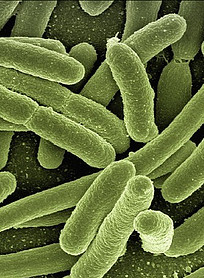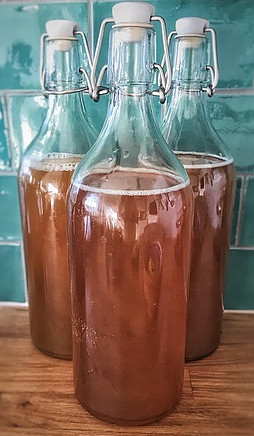
You may ask, for eczema don’t we need creams and ointments? How on earth do probiotics help eczema? If you don’t know this, it may surprise you to learn how closely and intricately linked the skin and the gut are. And how important it is to heal your leaky gut first, before taking on more natural probiotics in your diet, or supplementing.
The good and the bad, it all stems from the gut
The gut is at the core of our physical body. Every day of our life, it works for us, to digest the foods we eat, and to absorb the minerals, vitamins and all other nutrients, fueling us so we can function in our day-to-day living, growing new cells and repairing old ones.
In fact, the gut forms the unseen barrier between the outside world: the foods we eat, and the inside of our body: the bloodstream that circulates everywhere within, and brings the essential stuff to every cell and every organ in us. That is why we are what we eat, it goes right into us and makes us healthy or sick, depending on our choices together with existing health conditions.
When the gut is in a bad shape
A healthy digestive system is populated with hundreds of trillions of good microorganisms that help us to break down the food we eat, regulate our metabolism, and protect our immune system by supporting the immune cells that line the intestinal wall, among many other jobs that they are responsible for.
Due to various reasons like an unhealthy diet which feeds the bad bacteria, medication which wipes out the good microorganisms, etc. our gut microbial population can go out of balance. When that happens, our digestion gets compromised. We do not absorb the essential nutrients properly. Our immune system, which resides mainly in the gut, also gets compromised.
Combined with some other habits or situations which further deteriorate our gut health, it can lead to chronic health conditions like eczema. For instance, many eczema warriors are actually sensitive to some foods, unknowingly. Some of the top allergens include gluten, dairy, eggs, nuts, etc.
Gluten sensitivity (read more about it here), if not addressed, can lead to leaky gut. The other allergens can irritate the body and lead to a low level of chronic inflammation. All these, coupled with an imbalanced microbial population in the gut, result in a sensitive gut that reacts to more and more substances, even seemingly normal and harmless ones. Hence begins an endless cycle if the root of the problem is not tackled.
The undigested food particles, unwelcome proteins, toxins, and other undesirable substances cross the intestinal barrier which is only one cell thick, as it is now ‘leaky’ and not able to do its job properly in holding back these materials. This unwanted load circulating in the bloodstream has to go somewhere.
Chances are the main elimination organs like liver and kidneys are already overworked, so this waste is dumped out through the skin, one of our largest organs. Hence, the eczema symptoms of rashes, itching, chronic inflammation and a general sense of fatigue and low energy that plagues so many eczema warriors.
Heal leaky gut first
Wait… before you try to flood the digestive system with the good guys by taking probiotics, it is important to start healing the leaky gut first, so that the good microorganisms have a comfortable, stable and conducive environment to thrive in.
To do that, it all stems from your diet. Some of these have been addressed separately in other posts, so do take the time to read the links in the points below if you think it affects you.
- Eat clean and unprocessed foods which are natural and wholesome.
- Remove gluten from your diet. This is of utmost importance when it comes to healing a leaky gut, as gluten triggers enzymes that affects the hairlike structure of the intestinal cells, in people sensitive to it. This is detrimental to proper absorption of nutrients.
- Stay away from your triggers. This is easier said than done. Even the task of finding out the triggers in a person with eczema can prove to be a daunting and impossible task. So we took the ‘easy’ and yet not really so easy way out: eliminate the common suspects: dairy, eggs, nuts, nightshades, etc. Don’t forget that triggers can include environmental ones, like dust mite, pollen, chlorine, etc.
- Make bone broth part of your diet, as it has immense healing properties from the collagen, and minerals pulled out from the bones through prolonged period of simmering. The collagen is especially helpful in sealing a leaky gut.
Do probiotics help eczema – now the answer is YES
As you take action through the steps above and your leaky gut starts to heal, you should be able to tell by generally feeling better and having higher energy levels. Your eczema may not improve drastically yet, as there is still a lot of healing that needs to take place. The answer to the question, “Do probiotics help eczema?” is now an affirmative YES. Now is the time to include more probiotics in your diet, through natural sources or supplementation.

As your leaky gut starts to seal up, loading up on probiotics at this time will be the most beneficial, in preventing recurrence of leaky gut, as well as building up the immune system. The probiotics make up the good bacteria which your intestinal tracts have been missing when things were disrupted. Now your digestive function will improve, and absorption too.
As the immune cells build up the healthy mucous membrane that lines the intestinal wall, the probiotics support their function, as backed by this piece of research. Hence, your immunity is given a boost by taking probiotics.
At the same time, do continue to stay away from your triggers, through watching your diet and environment, so that the chronic inflammation can continue to calm down, and the immune system forgets about reacting to those substances. Over time, as your health builds up, you may be pleasantly surprised that you can take those troublesome foods or be exposed to environmental triggers without the usual reactions like eczema flares. And slowly but surely, your eczema will go away.
Probiotics in your diet
Natural sources
Fermented foods are great sources of probiotics. Kimchi, miso, sauerkraut, kefir, kombucha, etc. But to get the most benefit out of them, they have to contain live cultures. Depending on how these foods were processed and packed, there may not be any live cultures left by the time you take them, possibly due to pasteurising which removes all bacteria, or the canning process. So unless you know the source and the processes involved, it may be the best option to make these yourself at home.
The only food source of probiotics that I really wouldn’t recommend is yoghurt. Firstly it is dairy, so if you’re avoiding dairy, then you shouldn’t be taking yoghurt. Second, most commercial yoghurts are more sugars and flavourings than anything beneficial, marketed as being rich in probiotics but actually feeding the harmful bacteria even more. Unless your taste buds can take raw and unflavoured yoghurt, and your eczema does not react to dairy, otherwise yoghurt may not be such a great option for you.
Supplementation
Supplementing with higher doses of probiotics as you are repopulating your gut, and then moving on to a maintenance dose is an effective way to improve your digestive health, without the hassle of making your own fermented foods. A few things to consider when choosing your probiotics supplement, which I will be covering in more details in an upcoming post:
- the strains of probiotics used, single strain versus multistrain
- the concentration, and dosage
- the packaging and delivery process – whether it kills off some of the probiotics
- presence of prebiotics (food for the probiotics) within the supplement
Final thoughts
Heal from the inside out. It is all about what we put into our mouth, about whether the barrier between these foods and the bloodstream is in optimal health. Every bit of glowing skin and sparkle in the eyes stems from there… the gut. Every chronic inflammation and lethargy also stems from there… the same gut.
Once you understand the connections, you will be motivated to give your body the best chance at healing. Knowing how do probiotics help eczema will push you in the right direction of putting in this last piece of the puzzle, only after all the other efforts at healing your leaky gut have been worked on. Have faith, and heal your eczema naturally.

I really enjoy your posts because they are so thorough and well thought out. You don’t only explain why probiotics help with eczema but you actually go in detail of how it helps. I had no idea that you have to take care of your gut and what can cause your gut to be “leaky”. I have heard of going gluten free but I didn’t really understand what the benefits were, now I see why it would help someone with eczema. I have Keratosis Pilaris and I don’t know if going gluten-free would help me, but it’s something to think about and try.
Hi Victor,
I’ve read that moisturising your skin naturally could help with KP, as it’s a condition where the hair follicles are blocked by dead skin cells. Maybe you could try some natural oils, I’m not sure if that would help. For commercial moisturisers, do scrutinise the ingredients to check that there are no harmful chemicals.
My husband has stubborn eczema spots on his legs, and he uses diluted Apple cider vinegar to exfoliate the dead skin, it seems to help.
No matter what new stuff you’re trying for a first time, pls remember to do a patch test.
This article definitely resonated with me! Healing your body from the inside/out, is the key to being healthier! I am always on the lookout, for the most natural approach to healing, and I completely agree with, starting by changing the foods you eat! Doing this, as well as, taking supplements, has helped my health tremendously! I feel better all the way around and I saw positive results with my skin, right away!
Hi Janis,
I’m so happy to hear that you’re taking the natural route to a healthier you. That is definitely the way to go.
Stay healthy!
A really interesting article from my point of view.
As a teenager I suffered from a case of eczema and I was put on those horrible steroid creams…which only seemed to make the condition worse!
This is going back about twenty years now, and my mother finally sent me to a diet expert who actually discovered that I had a problem with dairy, like you mentioned in the article. As soon as I cut down the dairy the skin condition went – I was so relieved.
That’s why it’s so nice to read an article that covers probiotics for eczema, as there are so many alternatives out there (more natural) than steroid creams.
Hi Chris,
Right, steroids are a big NO for us too. It has caused my two eczema kids great suffering, creating much bigger problems than what they were trying to solve in the first place. It’s so not worth it. Doctors shouldn’t be dispensing them so freely for just any skin problem, they mess with our hormones, no joke.
I must say that I like how you describe this problem. Eczema is not something rare and all of us have it in some period of life. Honestly, I don’t like to use supplements because I prefer something more natural like kefir. I am using it every morning with flaxseeds and I can say that it is also very good combination. I will forward this article to my sister because she is more for probiotics.
Hi Daniel,
Kefir is a great natural probiotic. Great to hear that you’re already taking it on a daily basis.
I do hope this article will be helpful for your sister.
Thank you Joo for such an informative article. I have taken pro-biotics in the past and never seemed to get much of a benefit from them. I never realized that I needed to fix my leaky gut first in order to receive my maximum benefit from pro-biotics. I will definitely try cutting gluten and dairy products from my diet, I think that they may play a role in my leaky gut. I will let you know if your suggestions help me with my digestive issues. Thanks again!
Hi Micah,
We too, have spent a lot of money on probiotics in the past, and found the benefits only marginal. Now we know better, after researching on this topic. So I hope this bit of information can be helpful to people out there who are trying to heal themselves naturally.